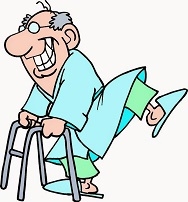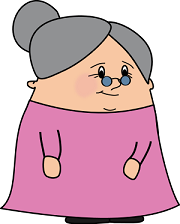If you were asked to choose one word to describe an “
older adult”, what would your answer be? Are the first things that come to mind negative connotations like “
frail” or “
grouchy”? Are they positive stereotypes, like “
wise” and “
experienced”?

We usually don't put much thought into stereotyping; grouping people into familiar categories is something that comes naturally. Nevertheless,
stereotyping can have a wide range of negative effects, specifically for older adults. The way most people view and/or stereotype older adults has a significant impact on their health and wellbeing, and the way people treat older adults as a result of these common stereotypes can have an even more powerful effect.
I am currently enrolled in the course “
Health Issues In Aging” offered at Western University. This course explores the environmental, physical, and
psychosocial issues that influence the health of older adults. We learned that when it comes to communicating with older adults, there are things that people can do or avoid to help them stay in the best shape possible, psychologically and physically.
A common mistake that you may be making is engaging in “
patronizing speech”, especially when providing care for an older adult. Patronizing speech basically refers to speaking to an older adult as if they are a child. Examples include using nicknames like “
honey”, using
over-inclusive language when speaking about a task that they need to do (“
Shall we put our shirt on? Shall we go to bed soon?”), and speaking unnecessarily slowly and loudly.

While there are usually good intentions behind this kind of speech and the people using it are just trying to be kind, it could lead to low self-esteem for the older adult being spoken to, and in turn a decline in psychological wellbeing. When we use patronizing speech, we are re-enforcing negative stereotypes and encouraging the older adult to internalize them. Of course, there are cases where speech should be modified for older adults, but
patronizing speech isn't the way to go about it. Repetitions, paraphrasing, and simple sentences are all good ways to communicate efficiently. Using high pitched voice and slower speech, on the other hand, does more harm than good.
Day-to-day interactions aside, there are some prominent issues in the way health care professionals view and interact with older patients. Most health care professionals are not taught how to adequately care for and communicate with older adults, and the result is major age bias in their healthcare.
When a doctor is giving information to an older person and their family is with them, it's not unusual for the doctor to speak only to the family and not to the person receiving the treatment. For instance, a doctor might tell the children of the older adult, “
she needs to take two pills a day” as oppose to looking at the older adult and telling them directly, “
you need to take two pills a day”. This could make the older person feel like they don't have control over their health and encourage them not be independent or
take on responsibility of taking their medication.

Another result of age bias in health care is that older adults rarely receive appropriate preventative screening measures like younger adults or children do. The typical rationale behind this belief, although it might not be said aloud, is that there isn't a point in making a big effort to prevent illness for older adults since they're not going to live as long in the first place. I was surprised to learn this fact – I thought that older adults should get the same opportunity for
illness prevention as any other person.
Hopefully you learned some tips about communicating with older adults that could help you help them in your everyday life. Next time you see doctors and nurses interact with an older patient, or watch someone talk to an older adult, observe whether they're doing it right or wrong – what you find might surprise you!

 We usually don't put much thought into stereotyping; grouping people into familiar categories is something that comes naturally. Nevertheless, stereotyping can have a wide range of negative effects, specifically for older adults. The way most people view and/or stereotype older adults has a significant impact on their health and wellbeing, and the way people treat older adults as a result of these common stereotypes can have an even more powerful effect.
We usually don't put much thought into stereotyping; grouping people into familiar categories is something that comes naturally. Nevertheless, stereotyping can have a wide range of negative effects, specifically for older adults. The way most people view and/or stereotype older adults has a significant impact on their health and wellbeing, and the way people treat older adults as a result of these common stereotypes can have an even more powerful effect.
 While there are usually good intentions behind this kind of speech and the people using it are just trying to be kind, it could lead to low self-esteem for the older adult being spoken to, and in turn a decline in psychological wellbeing. When we use patronizing speech, we are re-enforcing negative stereotypes and encouraging the older adult to internalize them. Of course, there are cases where speech should be modified for older adults, but patronizing speech isn't the way to go about it. Repetitions, paraphrasing, and simple sentences are all good ways to communicate efficiently. Using high pitched voice and slower speech, on the other hand, does more harm than good.
While there are usually good intentions behind this kind of speech and the people using it are just trying to be kind, it could lead to low self-esteem for the older adult being spoken to, and in turn a decline in psychological wellbeing. When we use patronizing speech, we are re-enforcing negative stereotypes and encouraging the older adult to internalize them. Of course, there are cases where speech should be modified for older adults, but patronizing speech isn't the way to go about it. Repetitions, paraphrasing, and simple sentences are all good ways to communicate efficiently. Using high pitched voice and slower speech, on the other hand, does more harm than good.
 Another result of age bias in health care is that older adults rarely receive appropriate preventative screening measures like younger adults or children do. The typical rationale behind this belief, although it might not be said aloud, is that there isn't a point in making a big effort to prevent illness for older adults since they're not going to live as long in the first place. I was surprised to learn this fact – I thought that older adults should get the same opportunity for illness prevention as any other person.
Another result of age bias in health care is that older adults rarely receive appropriate preventative screening measures like younger adults or children do. The typical rationale behind this belief, although it might not be said aloud, is that there isn't a point in making a big effort to prevent illness for older adults since they're not going to live as long in the first place. I was surprised to learn this fact – I thought that older adults should get the same opportunity for illness prevention as any other person.